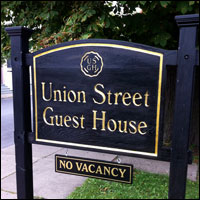
After writing a positive review of Roy’s Hawaiian Grill on Yelp, Matt Siltala received a “thank you” from the company and encouragement to visit the restaurant again. It’s that kind of active involvement with Yelp that Siltala, president of Avalaunch Media, recommends to his own clients.
“I love Roy’s Hawaiian Grill because it’s done that for me,” Siltala told CRM Buyer. “It makes you love the brand even more and go back more and spend more. I don’t think you have to respond to every positive review, but if any stand out to you as extra amazing, I think it is always a good idea to reward loyal customers.”
Yelp as Customer Service Channel
Consumers are turning to Yelp for reviews of everything from childcare to pet insurance, so it makes sense for businesses to take the site seriously as a tool for enhancing customer relations.
“One of the things we’re seeing with social media is it’s becoming a customer service channel,” Emily Hay, founder of Hay There Social Media, told CRM Buyer. “If someone has something to say about your business, it’s just as important to respond to those as it is to respond to a call or email.”
A business’s first step in effective Yelping is to understand that if it has a physical address, it probably already has a Yelp presence.
“You cannot opt out of Yelp,” Hay noted. “It’s the new yellow pages. It’s a phone directory as well as a review site. It’s worth the effort managing your Yelp page.”
That basic page doesn’t offer much for consumers to go on, though. It’s up to business owners to make sure that their Yelp sites are fully fleshed out with photos, menus, hours, and other details that will help customers and clients get the information they need.
“Put as much information on the Yelp page as you can,” said Hay. “If your Yelp listing looks kind of sad and empty, people might not stay on your page.”
With so many potential customers searching for, finding, and deciding whether to patronize businesses via Yelp, being actively involved with the site has become an important part of a business’s customer service mix.
“Reading and monitoring Yelp reviews is critical to a business’s real success,” said Siltala. “If you honestly care about your business and its customers, you want to know what you are doing right and what you are doing wrong. If you are not monitoring you could be letting a problem get more out of control then necessary.”
How to Respond
Because of the time it takes to respond to Yelp reviews, businesses need to decide whether all of their responses will be tailored to specific reviews or if they’ll sometimes use a stock response. Social media experts say that both approaches can work.
“Ideally, every response should be personal and specific,” said Hay. “Companies are getting good at making them personal — but in defense of the stock response, it lets you respond quickly. And sometimes it’s in my best interest for the company to say ‘Hey, we’d like to deal with this offline.'”
Another reason to use stock responses is to protect the privacy of consumers.
“Sometimes you can’t get into medical issues online,” said Hay. “The stock response can be appropriate when there are some privacy issues.”
Good, Bad or Indifferent
Businesses get a range of reviews on Yelp, and many experts suggest responding to all of them.
“Good, bad or indifferent, it should be responded to,” said Hay.
Negative reviews are a fact of life on Yelp, and businesses need to learn to deal effectively with them. It can be difficult not to be defensive — but before responding, business owners need to step back, take a deep breath, and make sure that their responses are balanced and calm.
“Don’t be emotional in a response,” said Hay. “It’s hard to not be defensive if someone has something negative to say, but it’s best if you give yourself a little bit of time. Cool down a little bit. Do some fact-checking. Put yourself in that person’s shoes and try to think of where they’re coming from. Is this a person who always leaves negative reviews? Is it a one-time or a long-time customer?”
Responding to negative reviews on Yelp isn’t so different from responding to unhappy customers in real life.
“It’s Customer Service 101: Acknowledge, apologize and remedy,” said Riggs. “You don’t have to apologize profusely. It’s good to acknowledge the problem and address it, but there are going to be some people who have had a bad day and leave a bad review.”
Most business owners understand the logic of responding to negative reviews, but they don’t always see the value in responding to the positive ones as well. Responding to positive reviews can be just as important, though. After all, they took time to write, and thanking reviewers for their positive comments shows that a brand is engaged and responsive.
“We don’t say ‘thank you’ enough,” Nate Riggs, founder and president of NR Media Group, told CRM Buyer. “I have great experiences all the time, but we don’t always leave reviews. People are busy. If someone does take time to write that review, write back a note of thanks.”
That simple “thank you” can go a long way toward building a strong, loyal customer base.
“Any opportunity you can take to build and strengthen a relationship with your customers will always pay huge dividends in the future,” Harley Lever, president of WeSprout Solutions, told CRM Buyer. “Thanking positive Yelp reviewers helps induce even more positive word-of-mouth advertising, and you will absolutely see the results in the bottom line.”












































